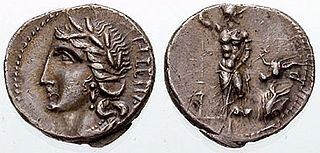Related Research Articles
In linguistics, declension is the changing of the form of a word, generally to express its syntactic function in the sentence, by way of some inflection. Declensions may apply to nouns, pronouns, adjectives, adverbs, and determiners to indicate number, case, gender, and a number of other grammatical categories. Meanwhile, the inflectional change of verbs is called conjugation.

Latin is a classical language belonging to the Italic branch of the Indo-European languages. Classical Latin is considered a dead language as it is no longer used to produce major texts, while Vulgar Latin evolved into the Romance Languages. Latin was originally spoken by the Latins in Latium, the lower Tiber area around Rome, Italy. Through the expansion of the Roman Republic it became the dominant language in the Italian Peninsula and subsequently throughout the Roman Empire. Even after the fall of Western Rome, Latin remained the common language of international communication, science, scholarship and academia in Europe until well into the early 19th century, when regional vernaculars supplanted it in common academic and political usage—including its own descendants, the Romance languages.
Latin declension is the set of patterns according to which Latin words are declined—that is, have their endings altered to show grammatical case, number and gender. Nouns, pronouns, and adjectives are declined, and a given pattern is called a declension. There are five declensions, which are numbered and grouped by ending and grammatical gender. Each noun follows one of the five declensions, but some irregular nouns have exceptions.
A rhyme is a repetition of similar sounds in the final stressed syllables and any following syllables of two or more words. Most often, this kind of rhyming is consciously used for a musical or aesthetic effect in the final position of lines within poems or songs. More broadly, a rhyme may also variously refer to other types of similar sounds near the ends of two or more words. Furthermore, the word rhyme has come to be sometimes used as a shorthand term for any brief poem, such as a nursery rhyme or Balliol rhyme.

A mnemonic device or memory device is any learning technique that aids information retention or retrieval in the human memory, often by associating the information with something that is easier to remember.

Oscan is an extinct Indo-European language of southern Italy. The language is in the Osco-Umbrian or Sabellic branch of the Italic languages. Oscan is therefore a close relative of Umbrian and South Picene.
In linguistics, a gerund is any of various nonfinite verb forms in various languages; most often, but not exclusively, it is one that functions as a noun. The name is derived from Late Latin gerundium, meaning "which is to be carried out". In English, the gerund has the properties of both verb and noun, such as being modifiable by an adverb and being able to take a direct object. The term "-ing form" is often used in English to refer to the gerund specifically. Traditional grammar makes a distinction within -ing forms between present participles and gerunds, a distinction that is not observed in such modern grammars as A Comprehensive Grammar of the English Language and The Cambridge Grammar of the English Language.

Latin is a heavily inflected language with largely free word order. Nouns are inflected for number and case; pronouns and adjectives are inflected for number, case, and gender; and verbs are inflected for person, number, tense, aspect, voice, and mood. The inflections are often changes in the ending of a word, but can be more complicated, especially with verbs.

William Lily was an English classical grammarian and scholar. He was an author of the most widely used Latin grammar textbook in England and was the first high master of St Paul's School, London.
Adpositions are a class of words used to express spatial or temporal relations or mark various semantic roles. The most common adpositions are prepositions and postpositions.

Latino sine flexione, Interlingua de Academia pro Interlingua or Peano's Interlingua is an international auxiliary language compiled by the Academia pro Interlingua under the chairmanship of the Italian mathematician Giuseppe Peano (1858–1932) from 1887 until 1914. It is a simplified version of Latin, and retains its vocabulary. Interlingua-IL was published in the journal Revue de Mathématiques in an article of 1903 entitled De Latino Sine Flexione, Lingua Auxiliare Internationale, which explained the reason for its creation. The article argued that other auxiliary languages were unnecessary, since Latin was already established as the world's international language. The article was written in classical Latin, but it gradually dropped its inflections until there were none.
Piphilology comprises the creation and use of mnemonic techniques to remember many digits of the mathematical constant π. The word is a play on the word "pi" itself and of the linguistic field of philology.
Carmen Possum is a popular 80-line macaronic poem written in a mix of Latin and English and dating to the 19th century. Its author is unknown, but the poem's theme and language enable one to surmise that he or she was from the United States of America and was either a teacher or at least a student of Latin.
In linguistics, a grammatical category or grammatical feature is a property of items within the grammar of a language. Within each category there are two or more possible values, which are normally mutually exclusive. Frequently encountered grammatical categories include:

The Turn of the Screw is a 20th-century English chamber opera composed by Benjamin Britten, with a libretto by Myfanwy Piper, based on the 1898 novella The Turn of the Screw by Henry James.
In linguistics, an inflected preposition is a type of word that occurs in some languages, that corresponds to the combination of a preposition and a personal pronoun. For instance, the Welsh word iddo is an inflected form of the preposition i meaning "to/for him"; it would not be grammatically correct to say *i ef.

English prepositions are words – such as of, in, on, at, from, etc. – that function as the head of a prepositional phrase, and most characteristically license a noun phrase object. Semantically, they most typically denote relations in space and time. Morphologically, they are usually simple and do not inflect. They form a closed lexical category.
In Latin grammar, the ablative case is one of the six cases of nouns. Traditionally, it is the sixth case. It has forms and functions derived from the Proto-Indo-European ablative, instrumental, and locative. It expresses concepts similar to those of the English prepositions from; with, by; and in, at. It is sometimes called the adverbial case, since phrases in the ablative can be translated as adverbs: incrēdibilī celeritāte, 'with incredible speed', or 'very quickly'.
Quenya is a constructed language devised by J. R. R. Tolkien, and used in his fictional universe, Middle-earth. Here is presented a resume of the grammar of late Quenya as established from Tolkien's writings c. 1951–1973. It is almost impossible to extrapolate the morphological rules of the Quenya tongue from published data because Quenya is a fictional and irregular language that was heavily influenced by natural languages, such as Finnish and Latin, not an international auxiliary language with a regular morphology.
Latin syntax is the part of Latin grammar that covers such matters as word order, the use of cases, tenses and moods, and the construction of simple and compound sentences, also known as periods.
References
- 1 2 3 4 Francoise Waquet (2003). "A Familiar World". Or the Empire of the Sign (in Latin). Verso. pp. 110–112. ISBN 1-85984-402-2.
- ↑ Robert Marzari (2006). Arabic in Chains: Structural Problems and Artificial Barriers. Verlag Hans Schiler. p. 120. ISBN 3-89930-119-6.
- 1 2 3 Robert Black (2001). Humanism and Education in Medieval and Renaissance Italy . Cambridge University Press. pp. 75–77. ISBN 0-521-40192-5.
- 1 2 3 Charles Garfield Nauert (2006). Humanism and the Culture of Renaissance Europe. Cambridge University Press. pp. 45–46. ISBN 0-521-83909-2.
- ↑ Thomas Sheridan (1994). "Preface". In Robert Hogan (ed.). The Poems of Thomas Sheridan. University of Delaware Press. p. 15. ISBN 0-87413-495-1.
- 1 2 Claire Seymour (2004). The Operas of Benjamin Britten: Expression and Evasion. Boydell and Brewer Ltd. p. 203. ISBN 1-84383-314-X.
- ↑ Metropolitan Opera Guild (1969–1970). Opera News. Vol. 34. Metropolitan Opera Guild.
- 1 2 Thomas Middleton (1998). Globe Theatre Staff (ed.). A Mad World, My Masters. Nick Hern Books. pp. 58, 83. ISBN 1-85459-409-5.
- ↑ An introduction to the Latin tongue. Eton, England: E. Williams. 1818. pp. 66–67.
- ↑ Thomas Middleton (1998). Michael Taylor (ed.). A Mad World, My Masters and Other Plays. Oxford University Press. p. 313. ISBN 0-19-283455-X.
- ↑ Helen Ostovich; Mary V. Silcox; Graham Roebuck (1999). "A Puppet Play In Pictures". Other Voices, Other Views: Expanding the Canon in English Renaissance. University of Delaware Press. p. 103. ISBN 0-87413-680-6.
- ↑ William Windham Bradley (1855). Latin exercises. London: Longman, Brown, Green, and Longmans. p. 153.
- ↑ John Barrow Allen (1875). A first Latin exercise book. pp. 46.
- ↑ A Shorter Latin Primer. ISBN 0-582-36241-5. https://archive.org/details/KennedysShorterLatinPrimer (Page 109) - This is the one I was taught.
- ↑ Robert Reid (1864). Old Glasgow and Its Environs: Historical and Topographical. pp. 284.